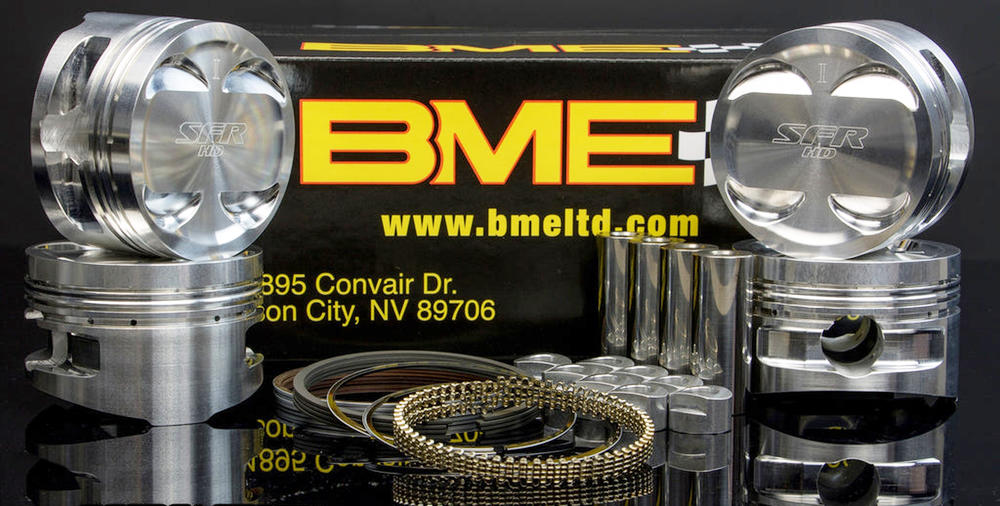BME Pistons: High Quality, Made to Order
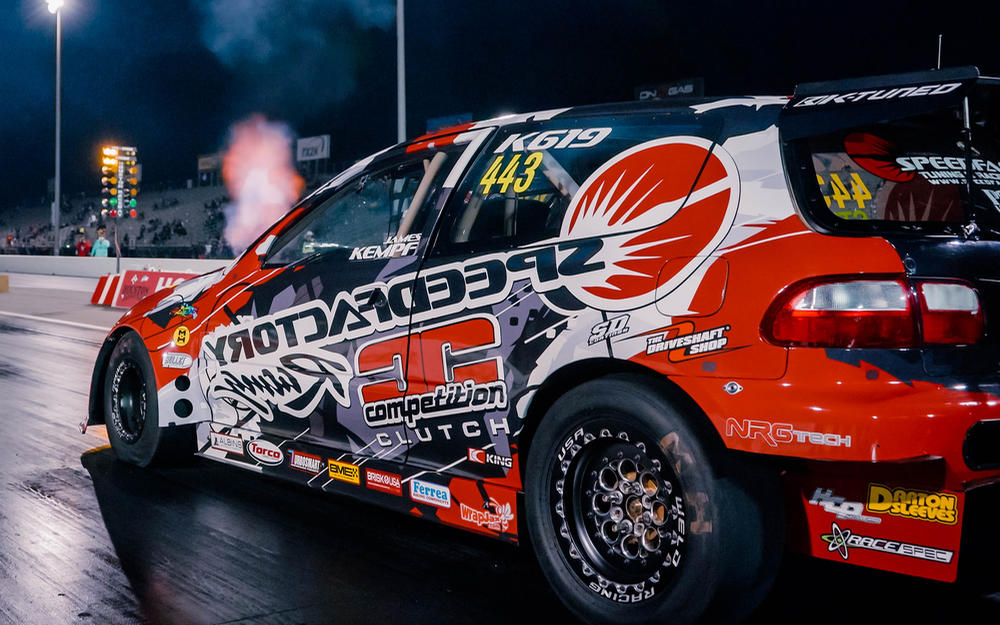
Four BME Forged Aluminum Pistons are in the 2400-horsepower engine of this Honda Civic, one of the quickest and fastest Hondas in drag racing. Image: Speed Factory Racing
At its manufacturing plant in Carson City, Nevada, Bill Miller Engineering has been manufacturing racing pistons for over forty years. "Here at BME," Bill Miller states, "I've decided to concentrate my efforts on making high-quality, high-tech racing pistons for racers who compete in specific types of motorsports using certain types of engines. By focusing on a limited number of hardcore racing piston types and making those pistons to order, we give our customers a measure of performance, quality, reliability, and durability no other piston manufacturer offers, and...we do that with short turnaround times.
BME Pistons: The Drag Racers' Choice
In 1982, Drag racing was the first market for the BME Forged Aluminum Racing Piston. Back then, the breakthrough came when legendary Top Fuel crew chief and tuner, the late Dale Armstrong, switched to BME. Since then, many discriminating drag racers have chosen BME Pistons for their engines.
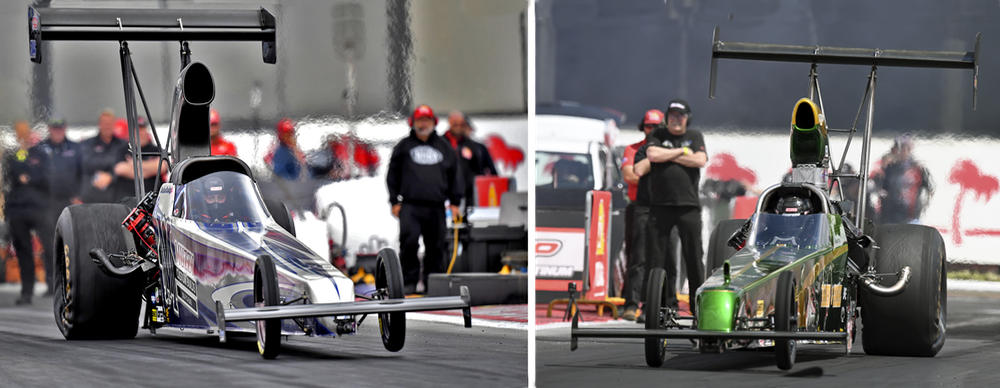
The Chesleigh Motorsports (left) and the Darien & Grisel Racing (right) BME-equipped dragsters run as NHRA Top Alcohol Dragsters but are unblown on fuel. Image: Auto Imagery
Bill Miller Engineering manufactures pistons for a wide range of drag racing applications. Currently, hot items are pistons for unblown fuel applications, all of which are treated with a very low temperature, hard anodizing process. Because of that process, BME Forged Aluminum Racing Pistons used by unblown nitro racers last up to twice as long.
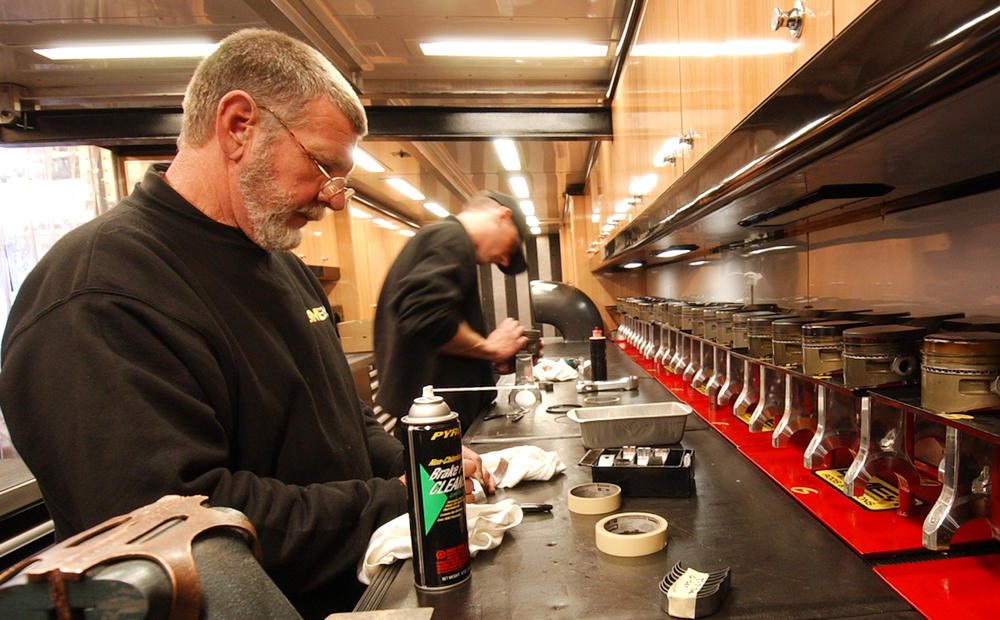
Two reasons some nitromethane burning engine builders choose BME Forged Aluminum Pistons are 1) their winning record and 2) their reliability. But there's a third important issue: cost. If pistons are more durable, they will last longer, and a team will need less of them. That makes the BME Piston not only a winner but also a great value. Image: BME
BME furnishes a lot of pistons to Top Alcohol Dragster and Funny Car racers. BME Forged Aluminum Racing Pistons are also common in the supercharged or turbocharged alcohol burning engines in Pro Mod cars. Top Pro Mod engine builders, such as Pro Line Racing, chose BME Pistons for their reliability and durability. One of the quickest and fastest BME equipped Pro Mods is Mark Micke's M&M Transmissions '69 Camaro. He set the Midwest Drag Racing Series eighth-mile Pro Mod series record with at 3.556/229.94. In quarter-mile testing, Micke's car has run a 5.35 at 272. The Camaro's engine is a 5200-horsepower, 564- in, turbocharged Proline Racing hemi fitted with BME Pistons, Rods, and Wrist Pins.
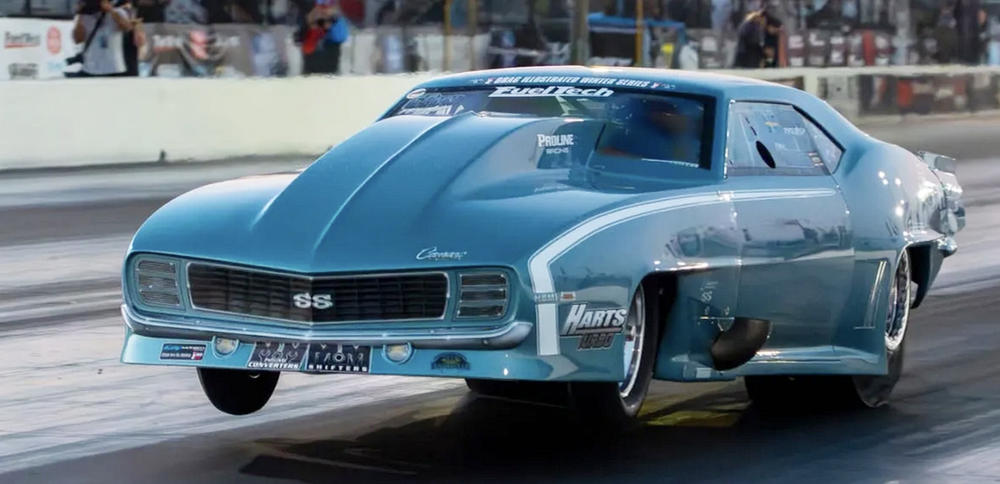
Mark Micke's 5200-hp, BME-equipped '69 Camaro was the #1 qualifier at the 2025 Pro Mod World Series. Image: Drag Illustrated
BME Pistons: Big in Import Drag Racing
In recent years, a significant part of BME Piston production has gone to the huge market that import drag racing has become. Many of the quickest imports in North America, Australia, and New Zealand are using Bill Miller Engineering Aluminum Racing Pistons, Aluminum Rods, and VascoMax Wrist Pins. Bill Miller Engineering makes Forged Aluminum Racing Pistons for Honda, Mitsubishi, Nissan, Toyota, and Subaru engines.
The quickest and fastest all-wheel-drive import in drag racing is SpeedFactory Racing's Honda Civic. Its best drag strip pass has been a stunning 6.65-second blast, and the car has trapped at an equally amazing 217.77 MPH.
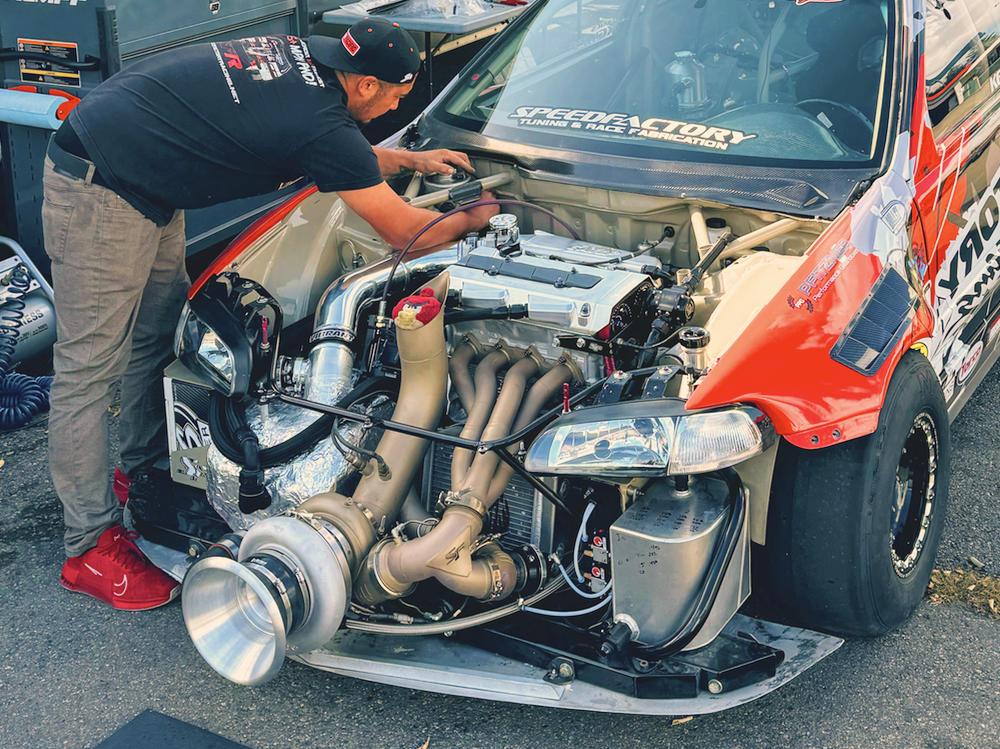
Team Co-Owner and Engine Builder, Kevin Kempf works on SpeedFactory Racing's BME-equipped, 2300-horsepower Honda Civic. Image: SpeedFactory Racing
The foundation of the 6.65-sec Honda's, turbocharged B-series, four-cylinder is a Bullet Race Engineering billet aluminum block fitted with BME Forged Aluminum Racing Pistons, BME Forged Aluminum Rods and BME VascoMax Wrist Pins.
Darren Palumbo's Bullet Race Engineering manufactures 6061 billet aluminum engine blocks for Honda, Mitsubishi, Nissan, and Toyota engines. "We recommend BME parts to all our customers using our billet blocks," Palumbo states.
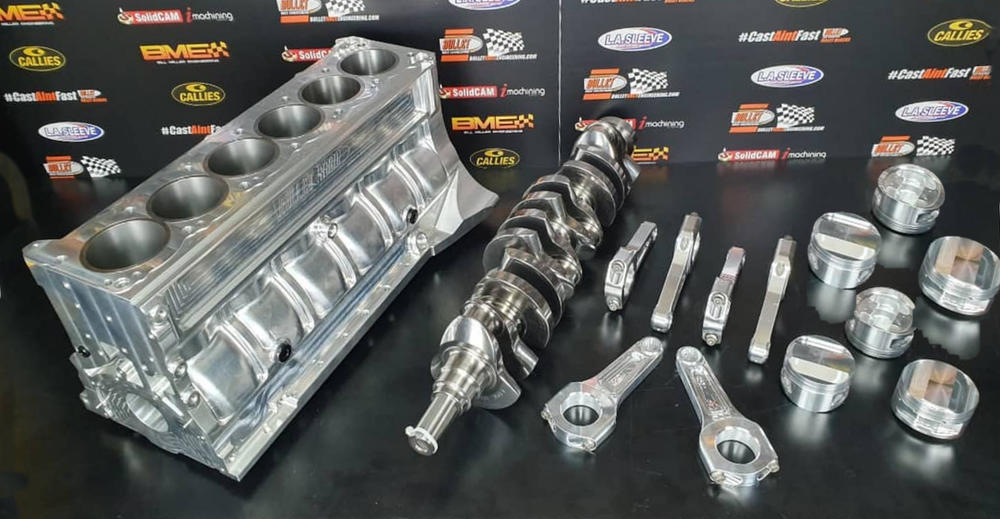
A Bullet Race Engineering Nissan RB30 Extreme billet aluminum block supports up to 3000-hp and is available with BME Pistons, Connecting Rods, and Wrist Pins along with a Calles Crankshaft. Image: Bullet Race Engineering
BME Pistons: 400+ MPH
11-13 August 2018, Bonneville Salt Flats, Utah. Danny Thompson, driving the twin-engine, all wheel-drive "Challenger 2," set the Southern California Timing Association (SCTA) AA/Fuel Streamliner National Record at 448.757 mph. Challenger 2 was built in the late '60s by Danny's Dad, Mickey, a famed 50s and 60s land speed racer who, in 1959, set a 345.33-mph record in the same class driving his four-engine Challenger 1.
The "C2", more aerodynamic with an inline pair of SOHC 427 Fords, was supposed to be the next big thing in piston-powered cars at the Salt. It was tested once at Bonneville in 1968 but never ran again until 2016, after Danny rebuilt it and changed the powertrain. The revised Challenger 2 has a pair of 500-inch, Brad Anderson Hemis, unblown on 87% nitro. Both are equipped with Bill Miller Engineering Forged Aluminum Racing Pistons as well as BME Aluminum Rods and BME Wrist Pins, parts that contributed performance, reliability, and durability needed to produce 5000-hp for at least two, five-mile runs required to set a record at a hair under 450 MPH. At this writing, seven years later, Danny's AA/FS record in the BME-equipped Challenger 2 still stands.
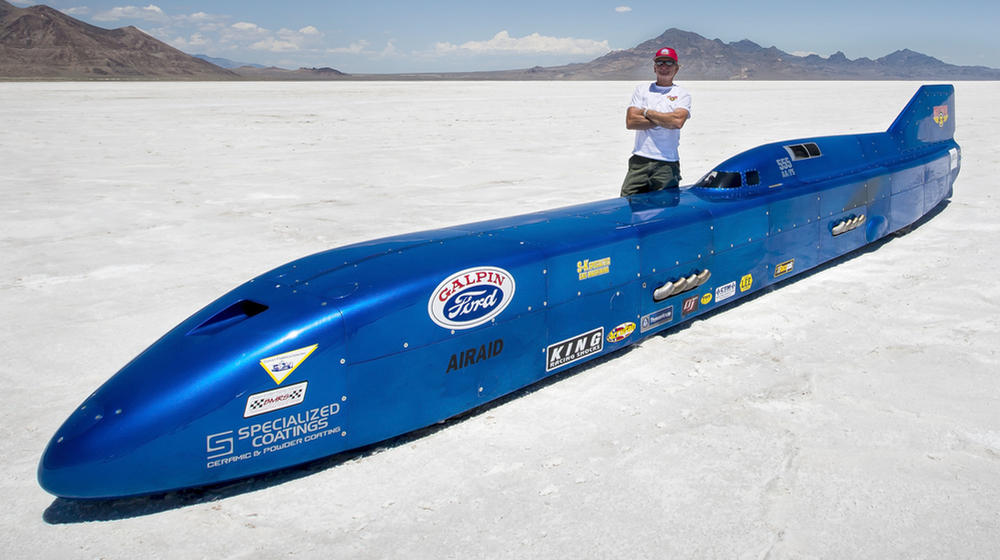
Danny Thompson with the BME-equipped Challenger 2. When he set the AA/FS record, he exited mile 5 at 459.588-mph. Image: ThompsonLSR
The most storied car in modern Bonneville racing history is the "Speed Demon 2," which runs in the SCTA's top class, AA/Blown Fuel Streamliner. It's powered by a single, 555-inch, twin turbocharged Big-Block Chevy on methanol. The Kenny Duttweiler-built Big-Block uses BME Forged Aluminum Pistons and makes 3156 hp at 8300 RPM.
13 August 2020: Speed Demon 2 was push-started for the "Up" run on the five-mile-long course. A few minutes later, George Poteet averaged 470.733 mph in mile five and exited at an astonishing 481.576.
The next day, starting at the other end of the course on its “Down Run”, Speed Demon did mile five at 469.298 and exited at 477.050. The two-run average was 470.015 mph, a new AA/BFS record. Eight BME Aluminum Pistons and Vasco Max Wrist Pins helped Poteet set that record, a mark that still stands five years later.
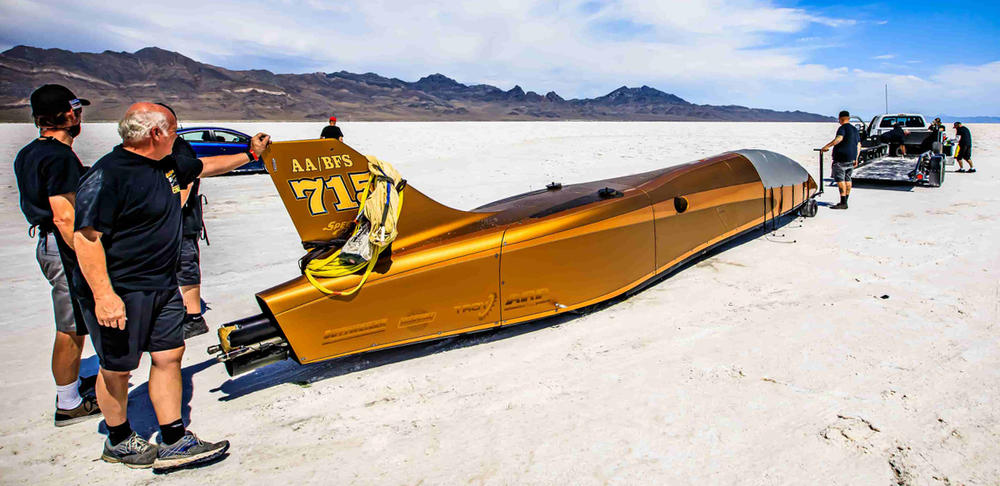
14 Aug 2020. The BME-equipped Speed Demon after George Poteet did a two-run average of 470.015 mph to set a new AA/BFS recod. Image: Speed Demon Racing
In 2023, George Poteet died from an embolism. Chris Raschke took over as Speed Demon Racing's driver and, the following year, set a B/BFS Bonneville record at 432.274 MPH. The "B-class engine" is a twin-turbocharged, 388-cuin Small-Block Chevy fitted with Bill Miller Engineering Forged Aluminum Racing Pistons and Vasco Max wrist pins. It makes 2663-hp@8800 RPM.
Tragically, Raschke died in a crash at Bonneville in early August 2025. He was attempting to better his B/BFS record in the new Speed Demon 3. Chris was Vice President at ARP, the longtime BME supplier of fasteners. He and BME President Bill Miller had been friends for years. Bill Miller Engineering extends its condolences to the Raschke family.
Two cars, the Challenger 2 and the Speed Demon, powered by engines equipped with Bill Miller Engineering Forged Aluminum Racing Pistons, spent more time on Bonneville Salt Flat at 400 MPH than any wheel-driven, piston-powered land speed cars in history.
BME Pistons are literally the fastest forged aluminum pistons you can get.
BME Pistons: Domination Down Under
Some of the best touring car road racing in the World is the Repco Supercars and Dunlop Super 2 Championships that run in Australia and New Zealand. Broadcast in 137 countries, they have worldwide appeal. Events average over 100,000 attendance, and the "Clipsal 500"–known as the "Daytona 500 of Australia"–draws a quarter of a million race fans. Series competitors have been, at various times, GM’s Holden brand, Chevrolet, Ford, Nissan, Mercedes, and Volvo.
Between 2010 and 2022, the Triple Eight Race Engineering team dominated the Repco series, winning the championship eight times. Triple Eight's Holden V8 race engines were built by KRE Racing Engines using Bill Miller Engineering Forged Aluminum Racing Pistons. Other teams used BME-equipped KRE engines, too. In six years, they won 2/3rds of the races. A key reason why KRE owned the Repco Supercars Championship for eight of 11 years was BME Forged Aluminum Racing Pistons.
BME dominates the Dunlop Super 2 series, too. Currently, about a third of the field is powered by KRE-built, Holden V8 engines fitted with BME Pistons. Between 2011 and 2023, BME equipped KRE engines won the Super 2 championship six times.
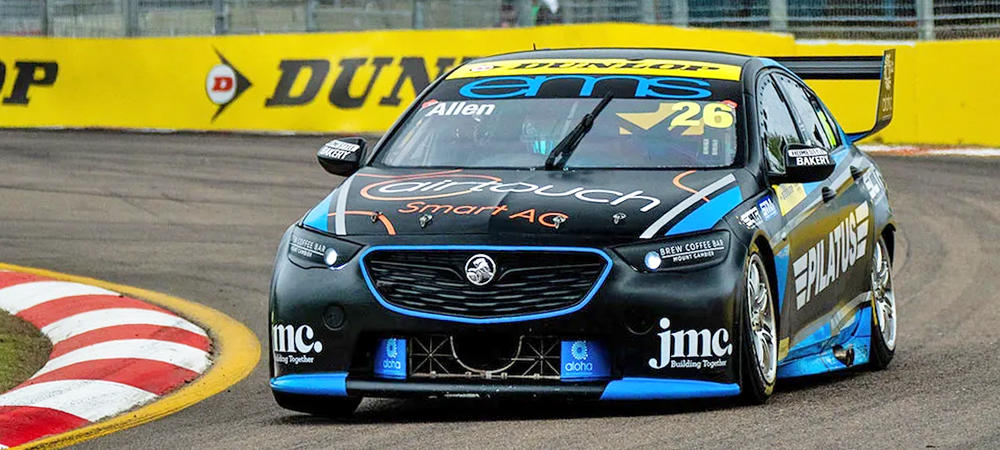
The most recent success for BME-equipped KRE Race Engines in Australian road racing came in 2023 when 18-year-old phenom, Kai Allen, drove an eggleston Motorsports Holden to the Dunlop Super 2 Championship. Image: Eggleston Motorsports
Bottom line: Down under road racers who win, use KRE Race Engines fitted with Bill Miller Engineering Forged Aluminum Racing Pistons.
NASCAR History Lesson
In the early 1990s, the engine shops of the two top Chevrolet teams in NASCAR Cup Racing, Hendrick Motorsports and Richard Childress Racing, experienced problems with degraded ring sealing due to "micro welding" between piston ring grooves and top rings.
In a racing engine, combustion heat absorbed by the piston top flows to the top ring groove, to the top ring, to the cylinder wall, and to the coolant in the engine block. To keep the piston top from overheating, this path must transfer heat rapidly enough that the piston stays as cool as possible.
This welding problem occurs at a micro-scale level between rough surfaces due to a combination of high friction, relative motion, and elevated temperatures. It is not full melting of the aluminum but rather a form of diffusion bonding or friction welding that occurs when the aluminum softens and bonds under pressure that exceeds the material's compressive strength. This causes aluminum from the piston to adhere to the ring. As the piston reciprocates rapidly, the adhered material is sheared off, creating craters or pits in the groove surface. These pits become leakage paths for combustion gases, which disrupt ring sealing and increase crankcase pressure, causing power loss.
Pistons available in the early-'90s had ring groove surface finishes so rough that heat transfer through the ring groove to the top compression ring was inhibited. The solution to micro welding developed by Bill Miller Engineering was a higher-quality, near-mirror finish on the ring grooves of BME Pistons.
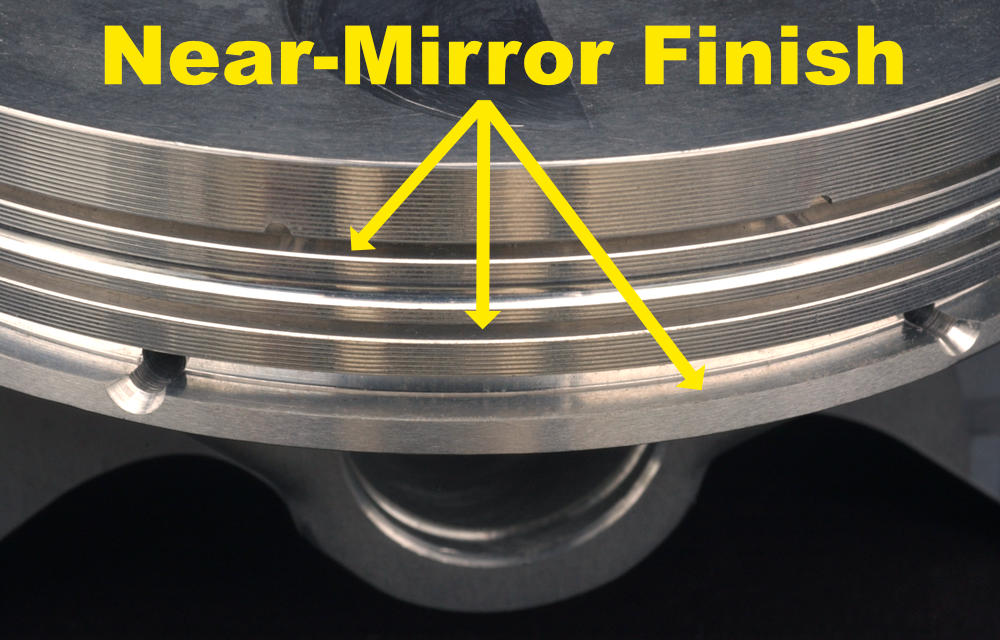
BME's superior manufacturing processes and rigorous quality controls reduced the tolerance for ring groove run-out to less than two ten-thousandths of an inch (.0002). The nearly mirror smooth ring groove surfaces improve heat transfer from the piston to the top ring. That reduces temperature at the top ring/groove interface and minimizes micro-welding. Ring seal during the intake stroke is enhanced. That increases the pressure differential caused by the piston moving down on the intake stroke, so the engine pulls in more air. More air means the engine can burn more fuel. The final result is more power.
In the mid-'90s, Hendrick and Childress switched to BME Pistons and gained 8-10 horsepower. In NASCAR, five horsepower is substantial and 8-10 is huge. Other teams followed HMS' and RCR's lead and, by the end of 1999, all the top GM teams in Cup were buying BME Pistons. Since then, BME Pistons have been in the engines of six NASCAR Cup Champions as well as in the engines of six winners of the Great American Race, the Daytona 500.
In 1998, the greatest driver of NASCAR's modern era, seven-time champion Dale Earnhardt, trusted the performance and reliability of BME Forged Aluminum Racing Pistons to help put his famed #3 Goodwrench Chevrolet in the victory circle at the Daytona 500.
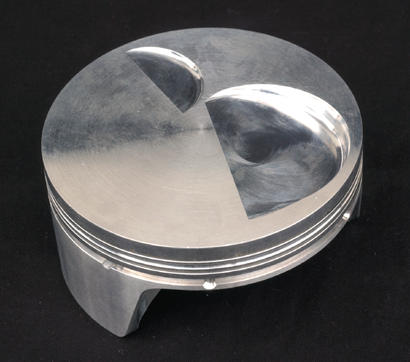
A BME NASCAR Cup piston of the type used in Dale Earnhardt's engine for the 1998 Daytona 500. Image: BME
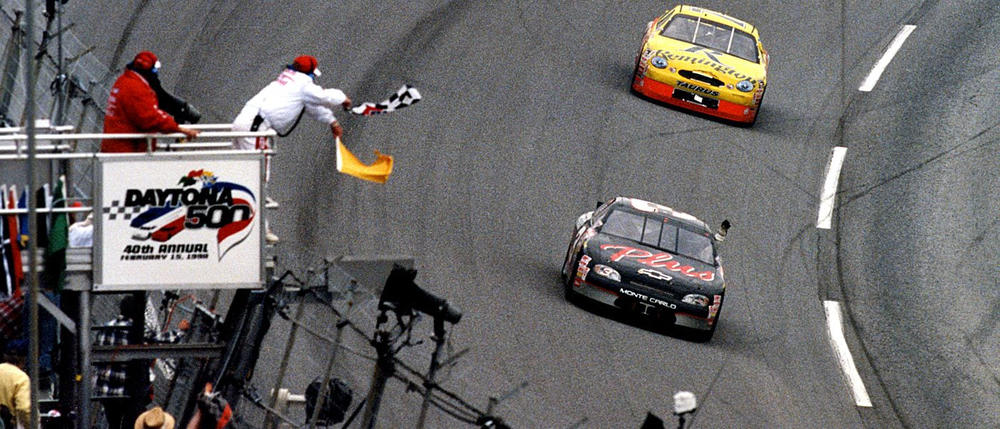
Considered his greatest victory. On his 20th attempt, Dale Earnhardt wins the '98 Daytona 500 in his BME-equipped Chevrolet Monte Carlo. Image: Richard Childress Racing
Piston Tech Briefing
Bill Miller Engineering Pistons are forged from 2618-T61 aluminum. BME has used 2618 for almost 25 years because Bill Miller believes it to be the best choice when strength and durability are prime considerations.
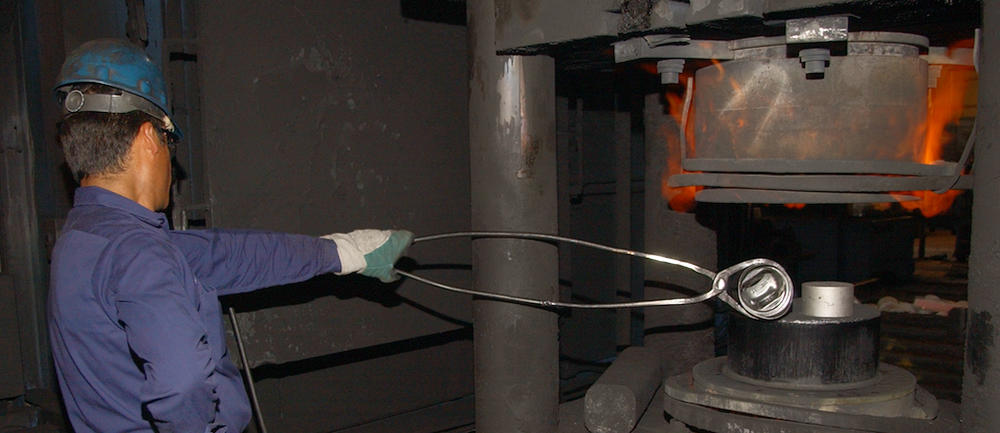
Bill Miller Engineering contracts with Aluminum Precision Products, a specialty foundry in Santa Ana, California for its piston and connecting rod forgings. Shown here is an APP working removing a BME 2618 aluminum piston forging. At right, waiting for the forge to cycle is a section of 2618 bar stock. The forging die is inside the flaming upper part of the forge. The temperature is 800°F. The forge applies 18,000 tons of pressure. Image: BME
Other piston manufacturers use a silicon-aluminum alloy, such as 4032 or MS75. Pistons made from those alloys have good wear characteristics because the silicon particulate's hardness improves the piston skirt's durability; however, silicon is also their downfall because it makes pistons brittle. Through race track testing, BME found that silicon-aluminum alloys are prone to fracturing when subjected to extreme loads.
This gets worse. With pistons made of brittle, silicon-aluminum alloys, once a crack starts, it doesn’t stop until the piston suffers catastrophic failure. In the rare case of a crack in a BME, 2618-T61 piston, once the crack reaches an area of lower stress, it stops, making immediate failure less likely.
Australian Supercar racers use BME pistons to win races with engines making upwards of 800 horsepower at up to 8000 rpm, and do that for over 600 miles or 12 hours. The choice of a strong and durable raw material, subtle differences in the design of the forging, and precision finishing of ring grooves are just some of the reasons why pistons made by Bill Miller Engineering outperform and outlast other racing pistons in road racing applications.
With its pistons for nitromethane fueled applications, BME takes durability measures even further by treating each piston to a very low temperature, hard anodizing process. As a result, compared to other brands, the BME Pistons used by a lot of injected-on-nitro racers last twice as long as other brands of pistons.
In addition to NASCAR and Australian Holden V8 Supercar racing pistons, BME makes pistons for the Chevrolet Big-Block V8, along with the "traditional" (Gen 1 and 2) and LS-type (Gen 3, 4, and 5) Small Block V8. For Ford engines, BME offers pistons for the BOSS 429, the 385-series 429 and 460 big-blocks, 289-302W, and the BOSS 302/351s. Bill Miller Engineering has Chrysler, late-Hemi-style pistons for unblown fuel and blown-alcohol applications, along with pistons for the older small-block Chryslers.
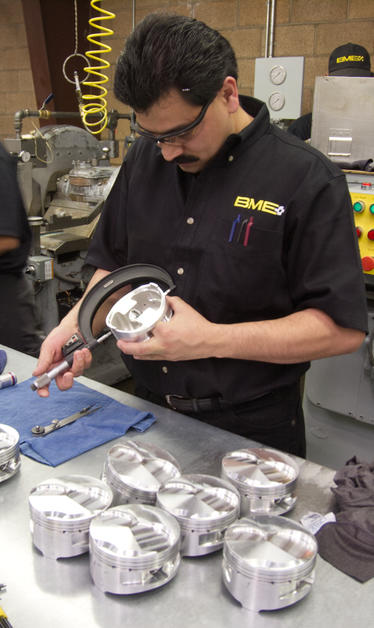
All Bill Miller Engineering Forged Aluminum Racing Pistons undergo continuous, stringent quality control inspections. Image: BME
Bill Miller Engineering makes no inventory items. All BME Forged Aluminum Racing Pistons are custom-made to the customer's specifications. Contact BME for piston pricing information.
At BME, great technical advice is the start of a custom piston order. Bill Miller has been in the racing piston business for more than four decades. He knows what works in a racing engine and what doesn't. He welcomes customers to call him with questions before ordering a set of pistons.
Bill Miller Engineering makes the most reliable and durable racing pistons in the business. The company prides itself on high-quality products, quick turnaround of orders, and outstanding customer service.
That combination is the sign of a great business–the one from which you should buy your next set of racing pistons.

Bill Miller discusses a custom piston order with a racer. Image: BME
